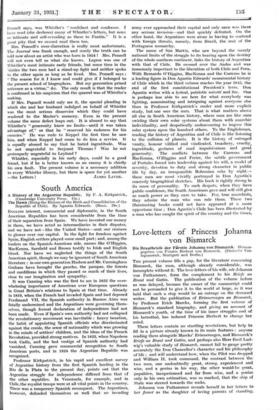South America
A History of the Argentine Republic. By F. A. Kirkpatrick. (Cambridge University Press. 158.)
ENGLISH interest, commercial and diplomatic, in the South American Republics has been considerable from the time
of their separation from Spain. We have invested our money in them, we have acted as intermediaries in their disputes, and we have not—like the United States—sent our cruisers to glower over our capital. In the fight for freedom against Spain, English settlers played some small part ; and, among the leaders on the Spanish-American side, names like O'Higgins, MacKenna, Sarsfield and Brown testify to Irish and English blood. Nor have we neglected the things of the South American spirit, though we may be ignorant of South American literature ; in our own generation Hudson and Mr. Cunningham Graham have brought the gaucho, the pampas, the forests and cordilleras in which they passed so much of their lives, close to our imagination and sympathy.
It was Canning who was the first to see in 1822 the over- whelming importance of American over European questions in Great Britain's relations to Spain at that time. Already in 1810, when the French had invaded Spain and had deposed Ferdinand VII, the Spanish authority in Buenos Aires was fatally undermined and the Argentines were governing them- selves, though formal declaration of independence had not been made. Even if Spain's own authority had not collapsed the revolutionary movement was inevitable : heavy taxation, the habit of appointing Spanish officials who discriminated against the creole, the sense of nationality which was growing in the minds of settlers' children, and the ideas of the French Revolution, provided strong motives. In 1823, when Napoleon took Cadiz, and the last vestige of Spanish authority had vanished, Canning gave commercial recognition to South American ports, and in 1824 the Argentine Republic was recognized.
Professor Kirkpatrick, in his rapid and excellent survey of Argentine history from the first Spanish landing in the Rio de Is Plata to the present day, points out that the Argentine struggle for independence differed from that of the other republics. In Venezuela, for example, and in Chile, the royalist troops were at all vital points in the country.
There was a temporary Spanish reconquest. The Argentines, however, defended themselves so well that no invading army ever approached their capital and only once was there any serious invasion—and that quickly defeated. On the other hand, the Argentines were alone in having to contend with foreign threats, namely, from Brazil, the seat of the Portuguese monarchy.
The name of San Martin, who saw beyond the merely national limits of the struggle to its bearing upon the destiny of the whole southern continent, links the history of Argentina with that of Chile. He crossed over the Andes and was immensely important to the liberation of both Chile and Peru. With Bernardo O'Higgins, MacKenna and the Carreras he is a leading figure in Don Agustin Edwards' monumental history of Chile which in the third volume reaches the year 1845, the end of the first constitutional President's term. Don Agustin writes with a lyrical, patriotic naivete and fire. One is perhaps less able to see here for what everybody was fighting, assassinating and intriguing against everyone else than in Professor Kirkpatrick's cooler and more explicit study, but one sees the men. That is what matters above all else in South American history, where men are like suns swirling their own solar systems about them with anarchic individuality, and despotically endeavouring to impose this solar system upon the hundred others. To the Englishman, reading the history of Argentina and of Chile is like listening to the collision of planets. It is the history of outraged vanity, honour vilified and vindicated, treachery, cruelty, ingratitude, gestures of mad impulsiveness and great generosity. The conflicts between the Carreras and MacKenna, O'Higgins and Freire, the subtle government of Portales forced into leadership against his will, a model of severity, devotion to duty and strong character in public life by day, an irresponsible Bohemian rake by night— these men are most vividly portrayed in Don Agustin's masterly biographical sketches. His book is rightly strong in its sense of personality. To such despots, when they have public confidence, the South Americans gave and will still give as much power as they care to take. For, true anarchists, they admire the man who can rule them. These two illuminating books could not have appeared at a more opportune time ; Don Agustin's Chile has been illustrated by a man who has caught the spirit of the country and the times.






































 Previous page
Previous page